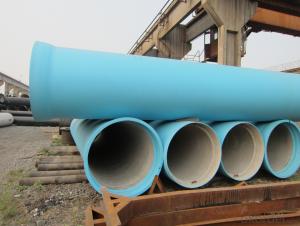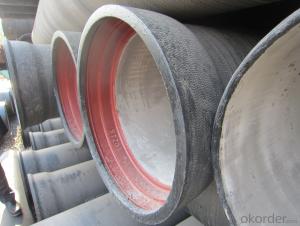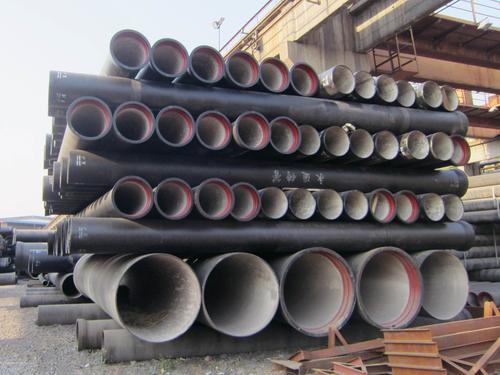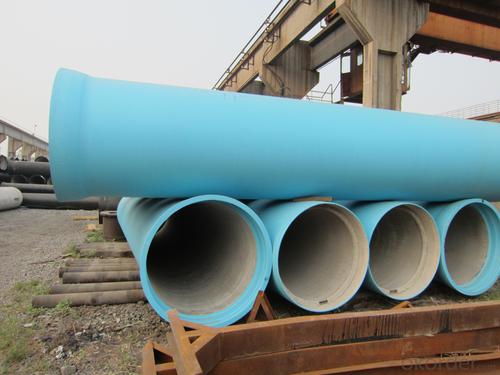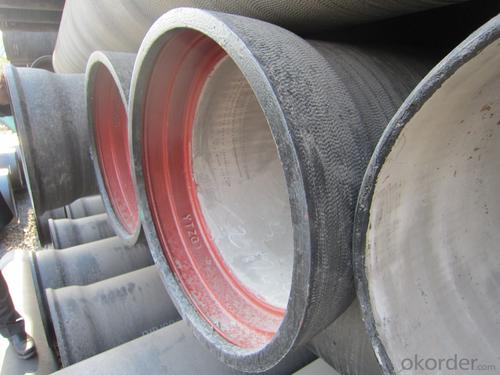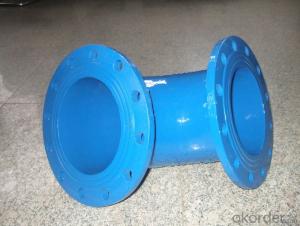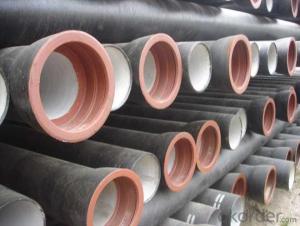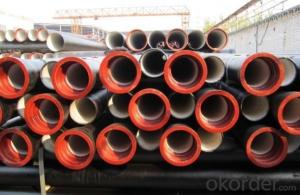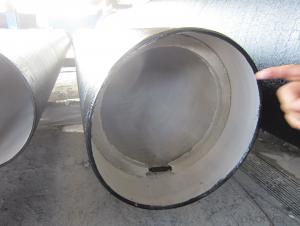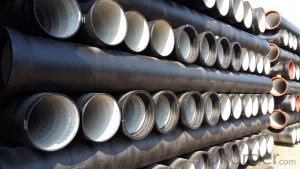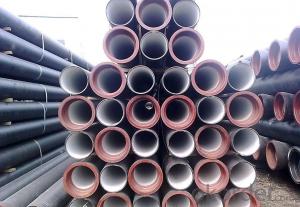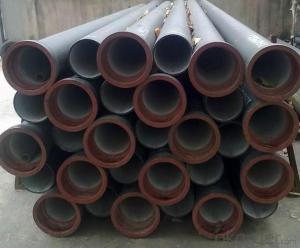Ductile Iron Pipe of China On Sale DI Pipe DN250 EN598
- Loading Port:
- China main port
- Payment Terms:
- TT or LC
- Min Order Qty:
- 20 m.t.
- Supply Capability:
- 200000 m.t./month
OKorder Service Pledge
OKorder Financial Service
You Might Also Like
1. Ductile Iron Pipe Description :
1) Pipes confirm to ISO2531,K9 class,T type joint,6m long,with inside cements lining conform to ISO4179, outside Zinc spraying(130g/m2) and bitumen coating(70μm) conform to ISO8179.
2) Pipe ends: Spigot and socket ends, with 100% SBR rubber gaskets accoding to ISO4633
3) we can do third party inspection according to customer's request.
4) Our products have been sold to many international market, such as Middle East and South East Asia and Africa.
2. Main Features of the Ductile Iron Pipe:
•High yield strength
•High tensile Strength
•High corrosion resistance
•Pressure Resistence
•Anti-corrosion
•Installation is convenient
•Satisfy the highest hygienic standards
3. Ductile Iron Pipe Images:
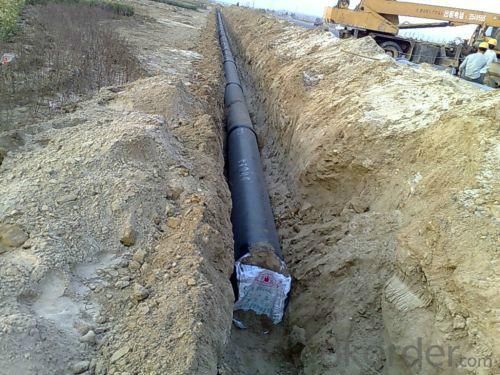
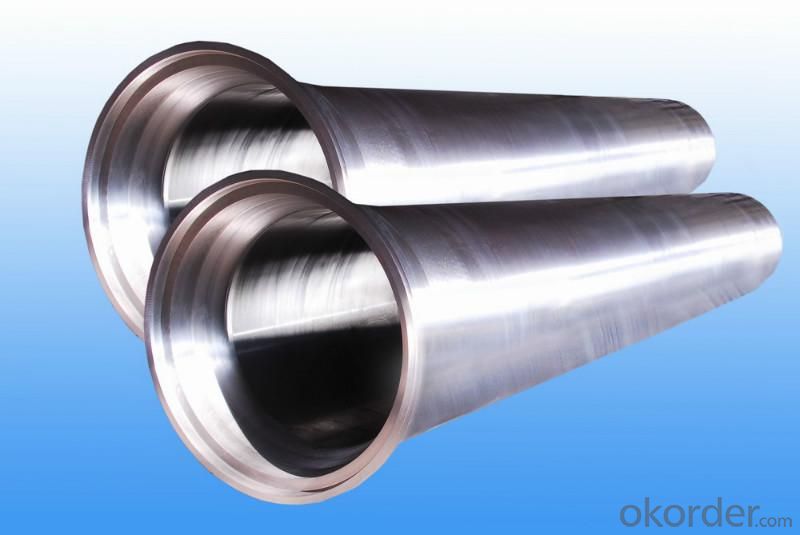
4. Ductile Iron Pipe Specification
Standard: API SPEC 5L 44th eidtion,ASTM A252-98(2007)
Grade: A53 Grades A/B, ASTM A106 Grades B/C,ASTM A179,AWWA, C200, ASTM A139, ASTM A120, API 5L Grade B,X42, X52, X56, X60, X65, X70, X80, X100
Weld Alternatives: LSAW
OD size range: 6.4~44.5mm
Wall thickness: 406.4~1422mm
Length: 3 - 12 m according to requirment
Note: Other grade can also be provided after consulting. Special design are available
5. FAQ:
We have organized several common questions for our clients,may help you sincerely:
1).Q: Why would you choose ductile iron pipe rather than other pipe materials?
A:The reasons are obvious for that not only ductile iron pipe possesses the inherent strength and flexibility of ductile iron, combined with proven corrosion protection systems, but also the cost savings can be achieved from design to installation and commissioning.
2).Q:Why can you guarantee the inner of pipes can’t be corroded?
A: High alumina cement mortar lining and sulphate-resistant cement mortar lining. These two special linings are applicable to inner anti-corrosion for sewage pipes, improving resistance to erosion of the sewage components.
- Q: Are ductile iron pipes resistant to alkali attacks?
- Ductile iron pipes have been proven to be highly resistant to alkali attacks. The material used in ductile iron pipes, known as ductile cast iron, is formulated with specific chemical compositions that provide exceptional corrosion resistance. This resistance extends to alkali attacks, which are chemical reactions that occur when alkaline substances come into contact with metals or other materials. Ductile iron pipes have a dense and protective oxide film on their inner and outer surfaces, which acts as a barrier against chemical attacks. This oxide film forms naturally over time, and its composition and structure provide excellent resistance to alkali attacks. Additionally, ductile iron pipes are often coated with various protective layers, such as epoxy or zinc, to further enhance their resistance to corrosion and chemical reactions. It is important to note that while ductile iron pipes are highly resistant to alkali attacks, the severity and concentration of the alkali substances can still impact their overall performance. In extreme cases, very high concentrations of alkali substances or prolonged exposure to aggressive alkaline environments may eventually cause some damage to the protective layers of the pipes. However, under normal conditions and within acceptable parameters, ductile iron pipes are considered to have excellent resistance to alkali attacks.
- Q: Can ductile iron pipes be used in culvert or storm sewer applications?
- Yes, ductile iron pipes can be used in culvert or storm sewer applications. Ductile iron pipes are known for their strength, durability, and resistance to corrosion, making them suitable for handling the high demands and harsh conditions typically found in culverts and storm sewers.
- Q: Are ductile iron pipes resistant to root intrusion?
- Ductile iron pipes are generally resistant to root intrusion, but not entirely immune. While the material itself is strong and durable, root intrusion can still occur through any cracks, joints, or damaged sections of the pipe. It is important to note that root intrusion is more common in older or poorly maintained pipes, where cracks or gaps may develop over time. However, modern ductile iron pipes are often coated with protective layers or linings to minimize the risk of root intrusion. Additionally, regular inspection and maintenance can help detect and address any potential issues before they escalate.
- Q: Can ductile iron pipes be used in contaminated groundwater systems?
- Yes, ductile iron pipes can be used in contaminated groundwater systems. Ductile iron pipes are known for their corrosion resistance, making them suitable for handling water with various levels of contamination. Additionally, their strength and durability allow them to withstand the harsh conditions of contaminated groundwater systems.
- Q: The difference between spheroidal graphite cast iron pipe and HDPE water supply pipe
- HDPE pipe is made of hot melt butt joint, and the strength of interface is very good. Ductile iron pipes are made of socket joint, and reinforced concrete piers shall be rammed on three links, elbows and other parts. In this regard, the cost of natural selection of ductile iron pipe, HDPE pipe than the choice of high.
- Q: How are ductile iron pipes made?
- Ductile iron pipes are made through a process called centrifugal casting. In this method, molten iron is poured into a rapidly spinning mold, which forces the iron to evenly distribute along the walls of the mold. As the mold continues to spin, the iron cools and solidifies, forming a hollow cylindrical shape. This process allows the iron to retain its strength and flexibility, making it suitable for use in various piping applications.
- Q: Can ductile iron pipes be used for submarine pipelines?
- Yes, ductile iron pipes can be used for submarine pipelines. Ductile iron is a strong and durable material that can withstand the harsh conditions underwater, making it suitable for submarine applications. Additionally, its corrosion resistance properties make it a reliable choice for transporting fluids in marine environments.
- Q: Which direction should the spigot of the K9 ductile iron pipe be installed?
- Compared with the PE pipe, from the installation time, ductile pipe PE pipe installation is simple and rapid, and after the installation of internal and external pressure bearing better tightness and corrosion resistance; from the point of view, ductile pipe sealing better after installation, but also can improve the corrosion resistance of corrosion protection through a variety of means; from the hydraulic performance, because ductile pipe specifications generally refers to the inner diameter of PE pipe diameter specifications generally refers to the same specifications, because under the condition of ductile pipe can achieve greater runoff; from the installation and maintenance cost, ductile pipe have more favorable price. The main components of ductile iron pipes are carbon, silicon, manganese, sulfur, phosphorus and magnesium. The inner wall of zinc spray, anti-corrosion materials such as cement mortar.
- Q: Can ductile iron pipes be used for dam construction?
- Indeed, dam construction can utilize ductile iron pipes. Renowned for their robustness, longevity, and resistance to corrosion, these pipes prove apt for various purposes, including the construction of dams. They exhibit remarkable resilience under intense pressure, rendering them perfect for transporting water and other fluids throughout the dam's framework. Moreover, their capacity to withstand external forces and ground shifts establishes them as a dependable option for dam construction. Furthermore, the relative ease of installation and maintenance of ductile iron pipes enhances their appropriateness for dam construction endeavors.
- Q: Do ductile iron pipes have inner enamel?
- Internal enamel ductile iron pipe is yes, but now there is almost no market (except for special process requirements), in the civil construction market, new materials, new technologies, new technologies can be replaced, there are many.
Send your message to us
Ductile Iron Pipe of China On Sale DI Pipe DN250 EN598
- Loading Port:
- China main port
- Payment Terms:
- TT or LC
- Min Order Qty:
- 20 m.t.
- Supply Capability:
- 200000 m.t./month
OKorder Service Pledge
OKorder Financial Service
Similar products
Hot products
Hot Searches
Related keywords

